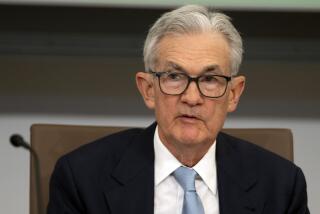Prosperity Masks Deep Problems, Fed Chief Says : Greenspan Sounds Warning on Deficit
- Share via
WASHINGTON — Federal Reserve Chairman Alan Greenspan on Thursday cautioned that recent good economic news is masking such continuing major problems as a “still massive” federal budget deficit that, if not reduced, will mean higher interest rates, a falling dollar and higher inflation.
The tone of much of Greenspan’s testimony to a House Banking subcommittee differed from glowing statements by Reagan Administration officials after the release Wednesday of figures showing that the economic expansion continued in the second quarter, with a substantial 3.1% rate of increase in inflation-adjusted gross national product.
“It is difficult to convince people that we have a problem when we unquestionably have a very vigorous economy, one which is by most indicators doing exceptionally well,” Greenspan said.
“That could very readily lead to a degree of euphoria and an unwillingness to come to grips with difficult problems,” the Fed chairman said. “We will find that when the problem hits, it will be very late in the game and very difficult to deal with. . . . It is very crucial that we resolve the (budget) deficit issue while the economy is doing well.”
Greenspan said eliminating the budget deficit in steps between now and 1993, as called for under the Gramm-Rudman-Hollings law, is “a good base line for a multiyear strategy, and I trust the Congress will stick with it. But we should go further. Ideally, we should be aiming at a federal budget surplus” to supplement private U.S. saving and help finance private investment.
Campaign Fodder
“I recognize that at some point taxes have to be part of the package,” Greenspan said, but added that the emphasis first should be on cutting spending.
Greenspan’s testimony came two weeks before the start of the Republican convention in New Orleans. Vice President George Bush, the expected nominee, is stressing the Reagan economic record in his campaign. Bush has said there is no need to raise taxes and that he will never do so.
Beryl Sprinkel, chairman of the Council of Economic Advisers, said the GNP figures showed “the economy, in its 68th expansion month, continues its stellar performance reflecting the pro-growth policies of this Administration. Furthermore, prospects remain favorable.”
Greenspan was more concerned about those prospects because the large budget deficits are linked directly to the nation’s equally large trade deficit, which must be financed by foreign capital invested in the United States.
“As a nation, we still are living well beyond our means; we consume much more of the world’s goods and services each year than we produce. Our current account deficit indicates how much more deeply in debt to the rest of the world we are sliding each year,” he said.
The Fed chairman noted that the trade deficit is falling about as fast at it can given the shortage of production capacity in many industries making goods for export. He also said the process would not go faster if the value of the dollar were to fall, again because of the shortage of capacity. Instead, he said, U.S. policies should aim at producing stability for the value of the dollar.
The U.S. current account, a broad measure that includes virtually all international transactions other than capital flows, was $160.7 billion in the red last year.
“The consequence of this external imbalance will be a steady expansion in our external debt burden in the years ahead,” Greenspan said. “No household or business can expect to have an inexhaustible credit line with borrowing terms that stay the same as its debt mounts relative to its wealth and income. Nor can we as a nation expect our foreign indebtedness to grow indefinitely relative to our servicing capacity without additional inducements to foreigners to acquire dollar assets. “
Deficit-Reduction Options
Those inducements would be either higher interest rates relative to inflation or a cheaper value for the dollar. In the latter case, foreign buyers of dollar-denominated assets would get a higher return on their investments because the purchase price, in their own foreign currency, would be lower.
The other way to reduce the country’s international deficit and the related risks, Greenspan told the subcommittee, is to reduce the imbalance between domestic spending and income by cutting the federal budget deficit.
“Domestic demands will have to continue growing more slowly than our productive capacity, as seems to have been the case so far this year, if net exports are to expand further without resulting in an inflationary overheating of the economy,” the Fed chairman continued.
“Absent this fiscal restraint, higher interest rates would become the only channel for damping domestic demands if they were becoming excessive. If a renewed decline in the dollar were adding further inflationary stimulus at the same time, upward pressures on interest rates would be even more likely.”
More to Read
Get the L.A. Times Politics newsletter
Deeply reported insights into legislation, politics and policy from Sacramento, Washington and beyond. In your inbox twice per week.
You may occasionally receive promotional content from the Los Angeles Times.










